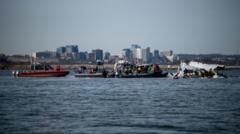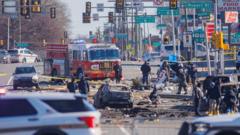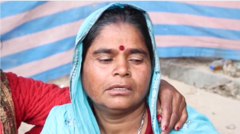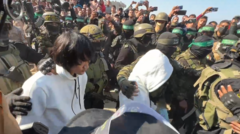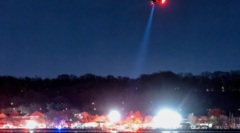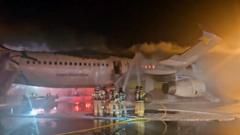The Jeju Air passenger plane crash in South Korea remains under investigation after a pre-flight inspection reported no issues, raising concerns over why the landing gear did not deploy during its emergency landing. With many families in grief and frustration, authorities are focused on identifying victims and determining contributing factors to the tragic accident that resulted in 179 fatalities.
Preliminary Checks Clear, Investigations Continue into South Korea's Deadliest Air Crash
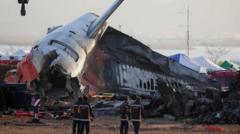
Preliminary Checks Clear, Investigations Continue into South Korea's Deadliest Air Crash
Jeju Air flight crash investigation intensifies as families seek answers and airline commits to increased safety measures.
A thorough pre-flight inspection of a Jeju Air plane, which tragically crash-landed in South Korea on Sunday, yielded "no issues," according to the airline's CEO, Kim Yi-bae. The Boeing 737-800 was involved in the incident at Muan International Airport while returning from Bangkok, resulting in the deaths of 179 passengers, save for two crew members. Eyewitness reports stated that the aircraft touched the runway approximately one-third of the way without landing gear deployed, subsequently skidding into a concrete wall.
As investigations continue, officials are delving into various factors, including the possibility of a bird strike or adverse weather conditions. Questions surrounding the runway's safety, including the presence of the wall, have also arisen. Families of the victims, many of whom have been gathering at the airport, are expressing their frustration over the slow identification process for the remains of their loved ones, with only a few bodies having been released so far.
During a press briefing, CEO Kim Yi-bae defended the airline's rigorous safety protocols and maintenance practices, explaining that clearance for takeoff would not have been granted without a thorough inspection. Jeju Air maintains a high ratio of maintenance employees to aircraft and claims improvements in its safety record over the years. However, Kim admitted that the airline has faced the most regulatory actions in South Korea among carriers but expressed a commitment to enhancing safety measures.
In light of the disaster, the airline announced plans to reduce its winter flight schedule by 10-15% to allow for additional maintenance work. In a gesture of support, Jeju Air will cover the funeral costs for all victims on board and offer grief counseling to affected families.
Among the deceased are passengers aged three to 78 years, with the majority in their middle age. Among the grieving relatives is Maeng Gi-su, 78, who lamented the loss of his nephew and his nephew's two children, underscoring the tragedy's emotional toll on families.
The runway where the crash occurred will remain closed as forensic teams continue their investigation. The airplane's black boxes are also being inspected, although one critical component is currently missing, potentially complicating the data recovery process. With investigators scrutinizing safety regulations related to the crash site, the search for answers continues amid widespread grieving and uncertainty.

